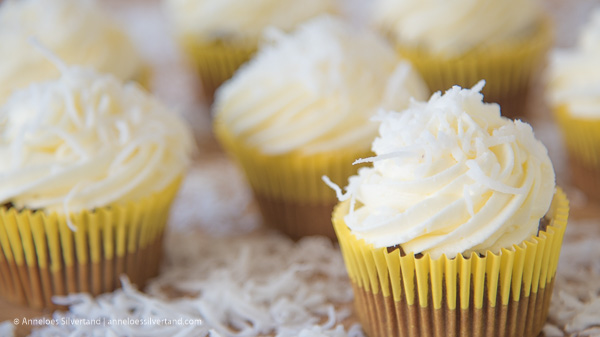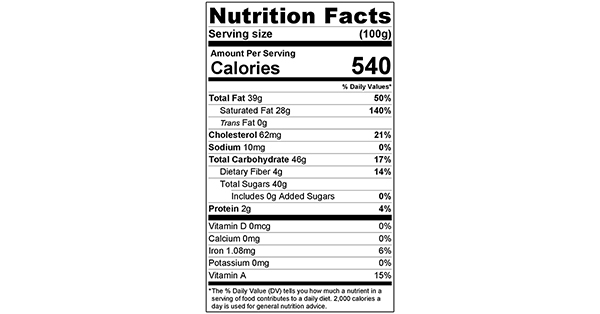Coconut Frosting: the best way to perfect a chocolate cupcake. Some frosting is a perfect way to keep cupcakes and cakes fresh for an extended period. You can not only prolong the shelf life, but you can also add new flavours to your baked goods. Before making this frosting, it is a good idea to check out my [Tips for Making Frosting] article. This will help you make the perfect frosting and could fix some problems you might have encountered on your frosting adventures!

If you have any dietary restrictions, always check the labels on the products you are using to make this recipe with. They will tell you if, for instance, your ingredient might contain traces of nuts, your products are made with dairy or if there is a chance the ingredients have come into contact with gluten-containing food or equipment.
Would you like to know more about what to look for when you are buying your products while you have dietary restrictions or preferences? Are you preparing food for someone who does? Check out my articles on [Food and Health] and learn more!
Do you like the Coconut Frosting recipe? Please share it or leave a comment and follow Truthful Food on social media so that you won’t miss out on anything new and delicious!
Ingredients
- 180 g Unsalted Butter - [See good to know section]
- 240 g Icing Sugar
- 90 g Coconut Butter - [See good to know section]
- 1/4 tsp Ground Salt
Other things you need
- Food Scale
- Mixer
- Sieve - This is optional.
- Spoon
Decorating Ingredients
- 80 g Dried Ground Coconut - [See good to know section]
Instructions
- Weigh your ingredients.
- Make sure your ingredients are at room temperature before you start. This will keep them from curdling.
- Beat the unsalted butter and the icing sugar for about 10 minutes with your mixer. You will see the colour of your mixture change slightly when it is ready. The frosting should be airy at this point.
- Add the coconut butter bit by bit while you keep mixing. Only add more after the last bit you added has been mixed in completely.
- Your Coconut Frosting is now ready to use and enjoy!
Good to know
- Storing: Make sure to store your frosting in an airtight container in your refrigerator if you are not using all of it right away.
- Shelf life: The frosting will stay good for several days if stored correctly.
- Decorating: Decorate the frosted baked goods with ground coconut.
- Adding dry ingredients: If you have the patience, it pays off to sieve dry ingredients while you are adding them. It will ensure you won’t end up with lumps in your frosting.
- Frosting temperature: Make sure the frosting is at room temperature before you work with it. If it is too cold, it is too stiff to work with. If it is too warm, it will be running.
- Tip: If you feel the frosting is too firm to decorate with, add a little bit of milk or water and mix it in. Do this till the frosting has the right consistency. On the other hand, if your frosting is too thin, just add a little more icing sugar.
- Tip: Use frosting to cover your baked goods. It will keep them from drying out and make them even more delicious.
- Organic: To make this recipe organic, only use organic ingredients.
- Vegan: Use vegan butter or margarine instead of unsalted butter. It is possible you need to add a bit more icing sugar to make sure the consistency of the icing is right. Use almond milk instead of cow’s milk.
- Lactose-Free: To make this recipe lactose-free, use lactose-free butter.
Nutritional Information per Portion
Know What You Eat
Both when buying food or when making your own, it is important to inform yourself about the nutritional value. Have a look at the nutrition label, learn about your serving size and what nutrients this product will bring to the table.
If you want to compare different products and their values, it is easier to look at a label where the values are given per 100 grams. This way you get a better understanding of the categories certain products belong to when it comes to nutritional values. Is this a product with a high sugar content? Does it contain a lot of fibre? How does this product measure up if I am looking to stick to a low-sodium diet?

Keep in mind that if you are looking to eat healthily, you should not just avoid eating fat and/or sugar. We need both in our daily diet. Make sure however to be aware of where you get your lipids and sugars from. As a rule of thumb, you could say; variation is very important in your diet and in general, the closer your food is to come straight from the source, the better.
If you want to read more about healthy food choices, check out my article [Healthy Food Choices]. Truthful Food also has a continuously growing article category solely focusing on specific ingredients and nutrients for everyone who wants to take a closer look at what you can find in your food.
*All given nutritional information is an indication. Due to differences in how ingredients are produced, where they are purchased and how the recipe is prepared, nutritional values may vary.
Leave a Reply